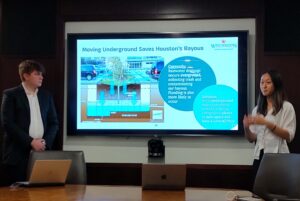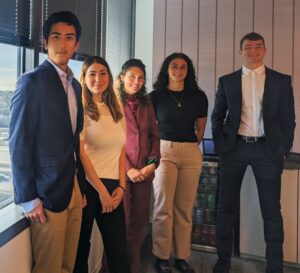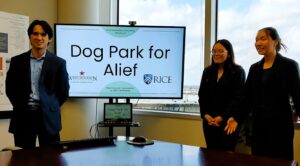For the last three years, the West Houston Association has been partnering with Rice University through their Social Science Consulting Practicum by providing the experiential learning opportunity for undergraduate students to apply their social science skills to real-world projects and thought processes. Bridging the gap between academia and workforce, students may notice growth in skills such as project management, research design, data analysis, and even communication. Throughout the hands-on practicum, students work with WHA’s expert members and faculty advisors on their projects to develop research questions, collect and analyze data, and present their findings and recommendations. During this partnership, the West Houston Association has engaged over forty students through fourteen projects each spanning various topics all relating to quality of life.
 The first project of the Fall 2023 cohort was once again led by Harry Thompson, Senior Attorney at Allen Boone Humphries Robinson, LLP and Vice Chair of WHA’s Sustainable Infrastructure Committee. Thompson presented the idea of examining the return on investment of sustainable infrastructure with the intent that demonstrating the monetary value of sustainable components within development will facilitate an increase in use of these elements. Thompson’s team included: William Grayer, Eliza Jasani, Amber Liu, and Sienna Tu. Their project focused on a series of interviews and case studies including: Kathleen English, a lead architect at English + Associates Architects who discussed the CoHousing Houston project and its integrated design, Noelle George, managing director of the WateReuse Association who highlighted the high costs of buying water from the city, and Kirby Liu, director of Lovett Commercial who shared experiences with adaptive reuse in the development of POST Houston. The team found that sustainable solutions, such as geo-exchange HVAC and stormwater drainage, could also be implemented independently to generate returns. The upfront costs of these sustainable solutions were higher than non-sustainable alternatives, but the long-term ROI justified the investment. Additionally, water reuse through direct potable reuse (DPR) was suggested as a cost-effective and environmentally sustainable solution, despite the challenge of finding suitable locations for water treatment plants. The team recommended a focus on integrated design, combining energy-efficient elements such as geothermal energy, design strategies for energy conservation, and improved water drainage systems through underground detention. This approach was seen as a financially viable solution with a strong return on investment.
The first project of the Fall 2023 cohort was once again led by Harry Thompson, Senior Attorney at Allen Boone Humphries Robinson, LLP and Vice Chair of WHA’s Sustainable Infrastructure Committee. Thompson presented the idea of examining the return on investment of sustainable infrastructure with the intent that demonstrating the monetary value of sustainable components within development will facilitate an increase in use of these elements. Thompson’s team included: William Grayer, Eliza Jasani, Amber Liu, and Sienna Tu. Their project focused on a series of interviews and case studies including: Kathleen English, a lead architect at English + Associates Architects who discussed the CoHousing Houston project and its integrated design, Noelle George, managing director of the WateReuse Association who highlighted the high costs of buying water from the city, and Kirby Liu, director of Lovett Commercial who shared experiences with adaptive reuse in the development of POST Houston. The team found that sustainable solutions, such as geo-exchange HVAC and stormwater drainage, could also be implemented independently to generate returns. The upfront costs of these sustainable solutions were higher than non-sustainable alternatives, but the long-term ROI justified the investment. Additionally, water reuse through direct potable reuse (DPR) was suggested as a cost-effective and environmentally sustainable solution, despite the challenge of finding suitable locations for water treatment plants. The team recommended a focus on integrated design, combining energy-efficient elements such as geothermal energy, design strategies for energy conservation, and improved water drainage systems through underground detention. This approach was seen as a financially viable solution with a strong return on investment.
“Through discussions with local architects and developers, I have gained a much deeper appreciation of urban issues, like flooding in Houston, and a better understanding of the kinds of green infrastructure we can think about implementing to mitigate these real challenges. Coming from a city that also experiences frequent flooding, this research project was certainly an interesting and eye-opening experience for me to learn about the benefits as well as difficulties of these preventative measures, such as their estimated returns on investment and their feasibility on a larger scale.” – Amber Liu
 The topic of return on investment of sustainable infrastructure was so popular among the students in the class that the faculty asked if we would be willing to host a second team working on it. Natale Chaney, Water Leader Municipal Services at RPS Group and Chair of WHA’s Sustainable Infrastructure Committee stepped up to work with the second team. Chaney’s team included: Sofia Dzodan, Tyler Field, Arielle Hayon, and Matthew Hong. In Phase 1, the team concentrated on Stakeholder Engagement, conducting interviews with developers, engineers, and government representatives to understand the challenges in sustainable infrastructure. Moving into Phase 2, a Literature Review & Data Collection was conducted to define successful projects through research and case studies. In Phase 3, the project concluded with the team presenting two project recommendations to the West Houston Association, including potential locations and computed ROIs based on the data collected. The objective was to demonstrate that sustainable projects offered superior financial outcomes compared to non-sustainable alternatives.
The topic of return on investment of sustainable infrastructure was so popular among the students in the class that the faculty asked if we would be willing to host a second team working on it. Natale Chaney, Water Leader Municipal Services at RPS Group and Chair of WHA’s Sustainable Infrastructure Committee stepped up to work with the second team. Chaney’s team included: Sofia Dzodan, Tyler Field, Arielle Hayon, and Matthew Hong. In Phase 1, the team concentrated on Stakeholder Engagement, conducting interviews with developers, engineers, and government representatives to understand the challenges in sustainable infrastructure. Moving into Phase 2, a Literature Review & Data Collection was conducted to define successful projects through research and case studies. In Phase 3, the project concluded with the team presenting two project recommendations to the West Houston Association, including potential locations and computed ROIs based on the data collected. The objective was to demonstrate that sustainable projects offered superior financial outcomes compared to non-sustainable alternatives.
“This was a unique experience to work with non-engineering students on the topic of sustainable infrastructure. They helped show that ROI can really be a driving factor for sustainable infrastructure.“ – Natalie Chaney

The third team consisting of Elizabeth Quach, Ben Teddlie, and Genesis Hahn, involved a collaboration with the Alief Super Neighborhood Council. The ASNC is a community organization in southwest Houston that serves as a citizen-based forum for residents to discuss and address local issues and priorities. One of their priorities is getting a dog park for their residents as Alief, despite being one of the most densely populated areas of Houston, lacks a public dog park. Therefore, this team was tasked with exploring how the community might be able to get a dog park, including examining existing public spaces for the possible addition of a dog park and considering sources of funding. The students suggested Boone Road Park as a location given its favorable location. Layout, and amenities. The project acknowledges certain risks, emphasizing the importance of communal engagement, consistent stakeholder meetings, and careful planning for land usage to mitigate challenges. They suggest that telling Alief’s story as a working-class population with an unmet communal need is essential for obtaining funding.
“This project was a wonderful experience. I learned how to approach a complex problem, develop strategies to solve it, and collaborate with my team. I was introduced to an entire community and tried my best to help it. Learning from the people of Alief was the best part of the process. I’m so thankful to have had this opportunity and share it with my teammates.” – Ben Teddlie
“I loved being a part of a real-world project with useful implications. I was especially happy to know my work was going to address a need within a local community. I learned how to use existing networks to reach experts in the field, and how to use those insights to guide my research. Finally, I learned how important being engaged and involved in the community is to driving necessary change.” – Elizabeth Quach
“I’ve lived in Alief for decades, and to see these young students pouring their energy into creating a dog park for our community warms my heart. Their dedication brings hope and joy, proving that the spirit of community and compassion continues to thrive in the hands of the next generation.” – Barbara Quattro, Chair, Alief Super Neighborhood Council
West Houston Association is proud to continue our relationship with Rice University and their School of Social Science Consulting Practicum. We look forward to the continued engagement and growth opportunities in Spring 2024 and beyond, including a follow up to the Dog Park project and continued exploration of the returns possible with sustainable infrastructure. Student finals reports from all the past projects are available as part of our Quality of Life Research series. Special thank you to Harry and Natalie for their time and efforts during these projects.
